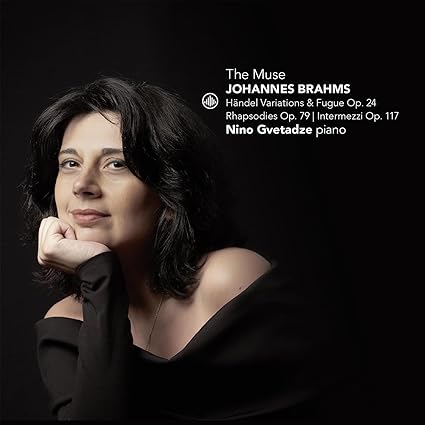

Johannes Brahms (1833-1897): Händel Variations & Fugue, Op.24 Johannes Brahms (1833-1897): Two Rhapsodies, Op. 79 Johannes Brahms (1833-1897): Three Intermezzi, Op. 117 Clara Schumann (1829-1896): Romanze No. 1 in A minor. Andante, from Three Romanzes, Op. 21
I thoroughly enjoyed this release, on three counts. Firstly, the program, second the recording, and last but not least the playing.
The program follows a fascinating path from the young confident pianist (the Variations), through inner Romantic turbulence of his mature style (Rhapsodies), ending in the introspection of more advanced years (Intermezzos). Listened to in one session, much like in a live concert, it has a satisfying arc. A short piece by Clara Schumann acting as a kind of epilogue, or even as a fittingly gentle encore.
I have to admit to ambivalence over some Brahms orchestral works, sounding somewhat cloying, at least in certain hands. His piano pieces have a different impact. While still often dense in texture when compared to Chopin as an example, they sound more like the pictures of the young Brahms, the Romantic artist. This release provides a fulfilling chronological path through some of the heights of his solo instrumental compositions.
Nino Gvetadze, born and trained largely in Georgia but based currently in the Netherlands, has released a series of interestingly curated solo piano recordings for Challenge Classics. This is the latest (5th) in that series. The recording throughout presents a very clear piano sound, with excellent dynamics, and without distracting sounds.
For the Variations, the soloist manages a deft balance of the formal, more Classical and the Romantic, erring on the latter side with a total performance slightly longer than average. For example, the Handel Aria and first variation are played fairly briskly, close to the original as was the custom. But by Variation 3 for example it is clear we are in the Romantic era, and have travelled some distance already from the original Handel. As a comparison, Murray Perahia's overall approach (on Sony Classical 88697 72725-2) feels more 'classical', almost crystalline in sound, compared to the rounded, softer bloom of the Challenge Classic release. Both approaches are valid of course, and Perahia's is a wonderful performance, the comparison making fascinating listening. With Ms. Gvetadze I sensed a lot of fun in variation XIV (the bier Keller is not far away!), sobriety and delicacy in variations XVIII to XXI, and with a forward-looking almost un-Brahmsian sound to variation IX that caught my attention. The greatest Variations as a form are a blending of technical and intellectual prowess and that combination is epitomized in the final fugue. It is presented here without a real break from the preceding variation, and with tangible delight and brilliance.
Moving to the Rhapsodies, we are definitely in the Romantic world. The contrast with the Variations is apparent in the first few bars and fits Ms. Gvetadze's approach ideally. Their driving passion is balanced nicely by the consolatory middle section in No. 1, and by the second theme and brooding middle section of No. 2.
The astonishing Op. 117 Intermezzos, along with the Opus 116, 118, 119 solo pieces are rightly regarded as the pinnacle of Brahms' piano works. They follow the Rhapsodies with strongly contrasting, yet simple melodies. In this performance I particularly appreciated the feeling of the composer being mentally cornered as tunes struggle to escape from a narrow range of notes. I am reminded of the incredible compositional achievement, without superfluous complication. Melodies emerge as if from a simple room with the introspective artist. Brahms is said to have referred to these works as 'the lullabies of my grief' and the pensive melancholy is well captured.
Overall, if you are either new to Brahms' piano music, or like listening to a varied single composer program, then this release can be recommended with confidence.
Ian Orbell - February 2024 Intermezzo No. 2 in B-flat minor